2000年日语能力测试四级真题和答案-打印版
2002年日语专业四级考试试题
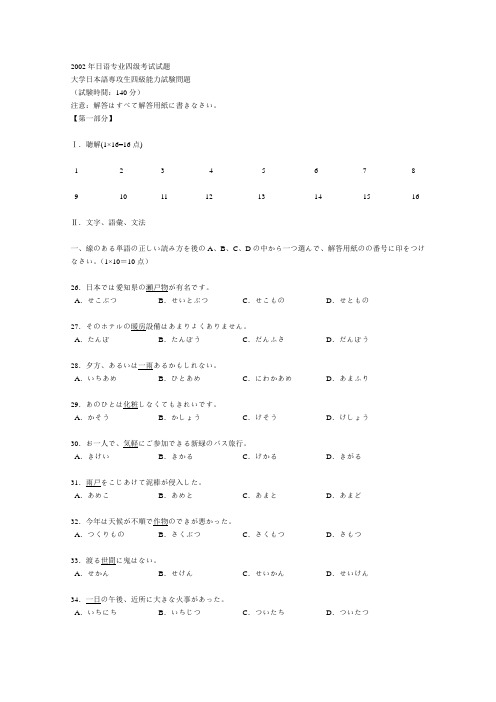
2002年日语专业四级考试试题大学日本語専攻生四級能力試験問題(試験時間:140分)注意:解答はすべて解答用紙に書きなさい。
【第一部分】Ⅰ.聴解(1×16=16点)1 2 3 4 5 6 7 89 10 11 12 13 14 15 16Ⅱ.文字、語彙、文法一、線のある単語の正しい読み方を後のA、B、C、Dの中から一つ選んで、解答用紙のの番号に印をつけなさい。
(1×10=10点)26.日本では愛知県の瀬戸物が有名です。
A.せこぶつB.せいとぶつC.せこものD.せともの27.そのホテルの暖房設備はあまりよくありません。
A.たんぽB.たんぼうC.だんふさD.だんぼう28.夕方、あるいは一雨あるかもしれない。
A.いちあめB.ひとあめC.にわかあめD.あまふり29.あのひとは化粧しなくてもきれいです。
A.かそうB.かしょうC.けそうD.けしょう30.お一人で、気軽にご参加できる新緑のバス旅行。
A.きけいB.きかるC.けかるD.きがる31.雨戸をこじあけて泥棒が侵入した。
A.あめこB.あめとC.あまとD.あまど32.今年は天候が不順で作物のできが悪かった。
A.つくりものB.さくぶつC.さくもつD.さもつ33.渡る世間に鬼はない。
A.せかんB.せけんC.せいかんD.せいけん34.一日の午後、近所に大きな火事があった。
A.いちにちB.いちじつC.ついたちD.ついたつ35.この手紙を書留にしてください。
A.しょりゅうB.しょとめC.かきとめD.かきどめ二、次の文のに入れる最も適当な言葉を後のA、B、C、Dの中から一つ選んで、解答用紙の該当記号に印をつけなさい。
(1×20=20点)36.ここは今は公園ですが、武士の庭でした。
A.生まれつきB.つまりC.もともとD.きっと37.両者の関係は冷えいた。
A.打ってB.立ってC.待ってD.切って38.よく来てくれました。
A.あれあれB.どれC.やっD.どれどれ39.各国の人と交流して、自分を。
日语四级真题最新答案解析

日语四级真题最新答案解析日语四级考试是日本国内最为知名和重要的日语水平考试之一。
每年两次的日语四级考试,使很多学习者都感到压力倍增。
而了解最新的答案解析对于备考的学生来说是至关重要的。
本文将为大家提供最新的日语四级真题答案解析,帮助大家更好地备考。
第一部分:听力解析日语四级听力是考生们最为关注的部分,也是很多人备考的难点。
下面我们来看一下最新一次考试的听力解析。
听力第一节:听对话,选择图片。
这部分的解析方式是先根据对话内容确定对应的图片,然后再确认选项是否符合对话。
1. 对话:Aさん:いってくるね!Bさん:いってらっしゃい。
解析:这是一段简单的交往用语,A说“我要出去了”,B回答“请多保重”。
因此正确答案应该是表示“离开”的那幅图片。
2. 对话:Aさん:このシャツはいくらですか?Bさん:ちょっと・・・それは2000円です。
解析:A问衬衫多少钱,B回答“那个,那件是2000日元”。
根据答语,应该选出表示“价格”的图片。
听力第二节:对话问答这部分的解析方式是根据问题和回答的内容,选择正确的选项。
3. 问题::いつもお母さんが朝ご飯を準備してくれますか?正确答案:Bさん:いいえ、自分で用意します。
解析:问题询问的是“你的妈妈一直给你做早饭吗?”B回答“不,我自己准备早饭。
”因此正确答案应该是表示个人做“饭”的选项。
4. 问题:子供のころ好きだった遊びは何ですか?正确答案:Aさん:アウトドアスポーツが好きでした。
解析:问题问的是“你小时候喜欢的游戏是什么?”A回答“我喜欢户外运动。
”因此正确答案应该是表示“户外运动”的选项。
第二部分:阅读解析日语四级阅读部分也是考试的一个重要组成部分。
下面我们来看一下最新一次考试的阅读解析。
阅读第一节:选择填空这部分的解析方式是根据文章内容和问题要求,选择正确的答案。
5. 文章:旅行会社が毎年発表している「世界のベスト10ビーチ」に、日本のビーチもランキングされている。
2003年日语能力考试四级真题及答案
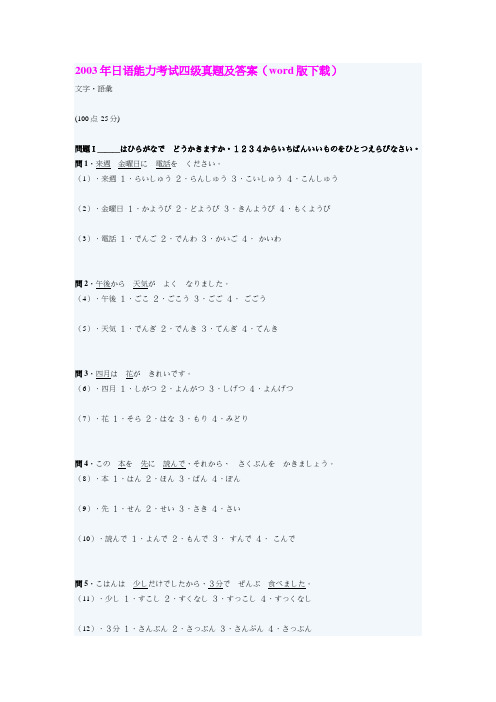
2003年日语能力考试四级真题及答案(word版下载)文字・語彙(100点25分)問題:___はひらがなでどうかきますか。
1234からいちばんいいものをひとつえらびなさい。
問1・来週金曜日に電話をください。
(1)〃来週1〃らいしゅう2〃らんしゅう3〃こいしゅう4〃こんしゅう(2)〃金曜日1〃かようび2〃どようび3〃きんようび4〃もくようび(3)〃電話1〃でんご2〃でんわ3〃かいご4〃かいわ問2・午後から天気がよくなりました。
(4)〃午後1〃ごこ2〃ごこう3〃ごご4〃ごごう(5)〃天気1〃でんぎ2〃でんき3〃てんぎ4〃てんき問3・四月は花がきれいです。
(6)〃四月1〃しがつ2〃よんがつ3〃しげつ4〃よんげつ(7)〃花1〃そら2〃はな3〃もり4〃みどり問4・この本を先に読んで、それから、さくぶんをかきましょう。
(8)〃本1〃はん2〃ほん3〃ばん4〃ぼん(9)〃先1〃せん2〃せい3〃さき4〃さい(10)〃読んで1〃よんで2〃もんで3〃すんで4〃こんで問5・こはんは少しだけでしたから、3分でぜんぶ食べました。
(11)〃少し1〃すこし2〃すくなし3〃すっこし4〃すっくなし(12)〃3分1〃さんぶん2〃さっぶん3〃さんぷん4〃さっぷん(13)〃食べました1〃さべました2〃たべました3〃なべましした4〃はべました問6・このへやは古いですから、安いです。
(14)〃古い1〃くろい2〃くるい3〃ふろい4〃ふるい(15)〃安い1〃ひろい2〃せまい3〃ひくい4〃やすい問題;___のことばはどうかきますか。
1234からいちばんいいものをひとつえらびなさい。
問1・でぱーとであたらしいかめらをかいました。
(16)〃でぱーと1〃デパート2〃テパート3〃チパート4〃モパート(17)〃あたらしい1〃新しい2〃薪しい3〃新い4〃薪い(18)〃かめら1〃カヌラ2〃カメラ3〃カヌウ4〃カメウ(19)〃かいました1〃売いました2〃店いました3〃員いました4〃買いました問2・じぶんのものにはなまえをかいてください。
大学四级日语真题答案解析

大学四级日语真题答案解析大学四级日语考试是许多想要证明自己日语水平的学生们所面临的重要挑战。
为了帮助广大考生更好地理解和应对这一考试,本文将对近年来的大学四级日语真题进行解析和分析。
第一部分:听力听力部分是大学四级日语考试中最具挑战性和时间紧迫的一部分。
考生需要在约45分钟的时间内完成40道题目。
在听力考试中,考生将面临各种各样的听力理解题,包括理解对话、广播新闻、短文等。
对于理解对话的题目,考生需要仔细倾听对话内容,注意对话中的关键词和主要信息。
同时,需要注意对话中的重要动词和形容词,以便更好地回答相关问题。
此外,考生还需要时刻保持专注,避免分心。
对于听力理解难度较高的题目,考生可适当使用排除法,通过排除错误选项来确定正确答案。
在理解广播新闻和短文的题目中,考生需要注意信息的层次性和关联性。
广播新闻和短文中通常会提到一些背景信息、事件发展以及其他相关细节,考生需要学会抓住关键信息并理解其与整体内容的关系。
在回答问题时,可将问题和听力材料中的主要观点进行对照,以此更好地确定正确答案。
第二部分:阅读阅读部分是大学四级日语考试中的另一个重要部分,其题目数量相对较多,需要考生有一定的阅读能力和速度。
阅读部分的题目包括选择题、填空题、简答题等。
为了更好地应对这一部分,考生需要具备一定的阅读技巧。
在阅读题目中,选择题是最常见的一种题型。
考生需要通过仔细阅读文章内容,准确理解文章的主旨和细节,以此来确定正确答案。
对于一些考试中稍微复杂的问题,考生可以采用排除法来确定正误。
填空题则要求考生能够理解文章的内容并将其适当地填入空白处。
在回答填空题时,考生需要依靠上下文以及词汇和语法知识来确定正确答案。
对于简答题,考生需要通过阅读文章并理解其中的观点和事实,以及作者的态度和立场。
在回答简答题时,考生需要通过自己的理解并结合文章内容来形成完整的答案。
此外,考生需要注意回答问题时的语言表达,避免语法错误和拼写错误。
第三部分:写作写作是大学四级日语考试中所需展示的另一个重要技能。
日语四六级解析真题及答案
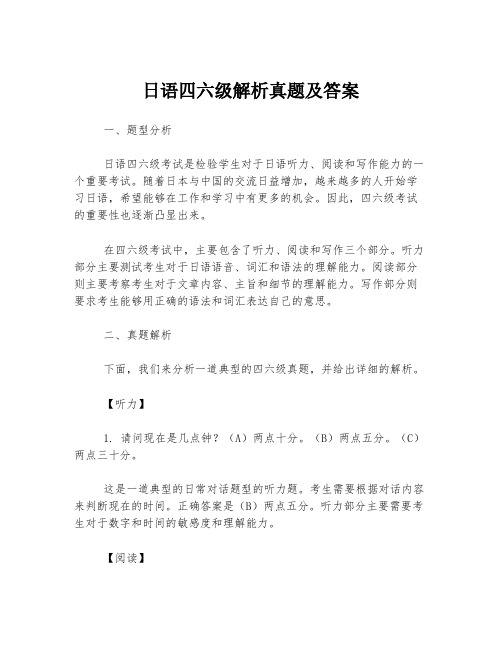
日语四六级解析真题及答案一、题型分析日语四六级考试是检验学生对于日语听力、阅读和写作能力的一个重要考试。
随着日本与中国的交流日益增加,越来越多的人开始学习日语,希望能够在工作和学习中有更多的机会。
因此,四六级考试的重要性也逐渐凸显出来。
在四六级考试中,主要包含了听力、阅读和写作三个部分。
听力部分主要测试考生对于日语语音、词汇和语法的理解能力。
阅读部分则主要考察考生对于文章内容、主旨和细节的理解能力。
写作部分则要求考生能够用正确的语法和词汇表达自己的意思。
二、真题解析下面,我们来分析一道典型的四六级真题,并给出详细的解析。
【听力】1. 请问现在是几点钟?(A)两点十分。
(B)两点五分。
(C)两点三十分。
这是一道典型的日常对话题型的听力题。
考生需要根据对话内容来判断现在的时间。
正确答案是(B)两点五分。
听力部分主要需要考生对于数字和时间的敏感度和理解能力。
【阅读】2. 下面哪个选项是正确的?今天是周末,我正在家里上网冲浪,突然接到了一个电话。
电话那头是我的朋友小明,他邀请我一起去看电影。
我当然愿意,于是我们决定在电影院门口碰面。
可是问题来了,我离电影院还有一段距离,我应该选择什么方式前往呢?(A)步行去电影院,这样既省钱又锻炼身体。
(B)骑自行车去电影院,这样既快又方便。
(C)坐公交车去电影院,这样既舒适又省事。
这是一道常见的选择题型的阅读题。
考生需要根据文章内容来判断应该选择哪种方式前往电影院。
正确答案是(B)骑自行车去电影院,因为既快又方便。
阅读部分主要考察考生对于文章的理解能力以及对于细节的把握能力。
【写作】3. 请列举你最喜欢的日本动漫,并简要介绍一下其内容。
这是一道开放题型的写作题。
考生需要根据自己的喜好来选择最喜欢的日本动漫,并简要介绍一下其内容。
写作部分主要测试考生的语法和词汇运用能力,同时也考察考生对于所选日本动漫的了解程度。
三、答案解析【听力】1. (B)两点五分。
这道题需要考生根据对话中的时间表达方式和数字来判断正确答案。
(完整word)2000年12月大学英语四级考试试题及答案,推荐文档

2000年12月大学英语四级考试试题试卷一Part I Listening Comprehension (20 minutes)Section A1. A) Get some change from Jane B) Use the woman’s phone.C) Go to look for a pay phone. D) Pay for the phone call.2 A) At a bookstore. B) In a workshop.C) At an art gallery. D) In a department store.3 A) She’s bought the man a pair of glasses today.B) She will help the man to catch up.C) She is worried about the man’s health.D) She has bought the man an up to date map.4 A) He is going to give a talk on fishing.B) He thinks fishing is a good way to kill time.C) He has the same hobby as Susan’s father.D) He is eager to meet Susan’s parents.5 A) He finds the presentation hard to follow.B) He considers the presentation very dull.C) He thinks Professor White has chosen an interesting topic.D) He speaks highly of the presentation.6. A) High quality paper. B) Typewriter.C) A bookshelf. D) Some stocks.7. A) They go to the seaside. B) They set off early.C) They go sightseeing. D) They wait for a fine day.8. A) He was late for school on the first day. B) He had a funny face.C) He was the first person she met at school. D) He liked to show off in class.9. A) Her car can stand any crash. B) Her car is not as good as his.C) Her car is maintained as well as his. D) Her car is kept in good condition.10. A) She is too busy to go. B) She doesn’t want to wait long.C) She’s willing to go swimming. D) She enjoys the wonderful weather. Section BPassage OneQuestions 11 to 13 are based on the passage you have just heard.11. A) He was once a friend of the ruler.B) He was a tax collector.C) He was a government official.D) He was once a schoolteacher in India.12. A) To declare new ways of collecting tax.B) To entertain those who had made great contributions to the government.C) To collect money from the persons invited.D) To reward outstanding tax collectors.13. A) They tried to collect more money than the ruler asked for.B) They were given some silver and gold coins by the ruler.C) They were excused from paying income tax.D) They enjoyed being invited to dinner at the ruler’s palace.Passage TwoQuestions 14 to 16 are based on the passage you have just heard.14. A) They liked traveling.B) They wanted to find a better place to live in.C) They were driven out of their homes.D) The reasons are unknown.15. A) They try to put up with Gypsies.B) They are envious of Gypsies.C) They are unfriendly to Gypsies.D) They admire the musical talent of the Gypsies.16. A) Special schools have been set up for them.B) Permanent homes have been built for them.C) They are now taught in their own language.D) They are now allowed to attend local schools.Passage ThreeQuestions 17 to 20 are based on the passage you have just heard.17. A) The causes are obvious. B) The causes are very complicated.C) The causes are familiar. D) The causes are not well understood.18. A) Regular driver training. B) Improved highway designC) Stricter traffic regulations. D) Better public transportation.19. A) Highway crime. B) Poor traffic control.C) Confusing road signs. D) Drivers’ errors.20. A) designing better cars.B) Building more highways.C) Incr easing people’s awareness of traffic problems.D) Enhancing drivers’ sense of responsibility.Part ⅡReading Comprehension (35 minutes)Passage OneQuestions 21 to 25 are based on the following passage.Dogs are social animals and without proper training, they will behave like wild animals. They will spoil your house, destroy your belongings, bark excessively, fight other dogs and even bite you. Nearly all behavior problems are perfectly normal dog activities that occur at the wrong time or place or are directed at the wrongthing. The key to preventing or treating behavior problems is learning to teach the dog to redirect its normal behavior to outlets that is acceptable in the domestic setting.One of the best things you can do for your dog and yourself is to obedience train(驯服) it. Obedience training doesn’t solve all behavior problems, but it is the foundation for solving just about any problem. Training opens up a line of communication between you and your dog. Effective communication is necessary to instruct your dog about what you want it to do. Training is also an easy way to establish the social rank order. When your dog obeys a simple request of “come here, sit,” it is showing obedience and respect for you. It is not necessary to establish yourself as top dog or leader of the dog pack (群) by using extreme measures. You can teach your dog its subordinate(从属的)role by teaching it to show submission to you. Most dogs love performing tricks for you to pleasantly accept that you are in charge.Training should be fun and rewarding for you and your dog. It can enrich your relationship and make living together more enjoyable. A well-trained dog is more confident and can more safely be allowed a greater amount of freedom than an untrained animal.21. Behavior problems of dogs are believed to .A) be just part of their nature B) worsen in modern societyC) occur when they go wild D) present a threat to the community22. The primary purpose of obedience training is to .A) teach the dog to perform clever tricksB) make the dog aware of its owner’s authorityC) provide the dog with outlets for its wild behaviorD) enable the dog to regain its normal behavior23. Effective communication between a dog and its owner is .A) essential to solving the dog’s behavio r problemsB) the foundation for dogs to perform tasksC) a good way to teach the dog new tricksD) an extreme measure in obedience training24. Why do pet dogs love performing tricks for their masters?A) To avoid being punished.B) To show their affection for their masters.C) To win leadership of the dog pack.D) To show their willingness to obey.25. When a dog has received effective obedience training, its owner .A) can give the dog more rewards B) will enjoy a better family lifeC) can give the dog more freedom D) will have more confidence in himselfPassage TwoQuestions 26 to 30 are based on the following passage.Engineering students are supposed to be examples of practicality and rationality, but when it comes to my college education I am an idealist and a fool. In high school I wanted to be an electrical engineer and, of course, any sensible student with my aims would have chosen a college with a large engineering department, famous reputation and lot s of good labs and research equipment. But that’s not what I did.I chose to study engineering at a small liberal-arts(文科) university that doesn’t even offer a major in electrical engineering. Obviously, this was not a practical choice; I came here for more noble reasons. I wanted a broadeducation that would provide me with flexibility and a value system to guide me in my career. I wanted to open my eyes and expand my vision by interacting with people who weren’t studying science or engineering. My parents, teachers and other adults praised me for such a sensible choice. They told me I was wise and mature beyond my 18 years, and I believed them.I headed off to college sure I was going to have an advantage over those students who went to big engineering “factories” where they didn’t care if you had values or were flexible. I was going to be a complete engineer: technical genius and sensitive humanist(人文学者) all in one.Now I’m not so sure. Somewhere along the way my noble ideals crashed into reality, as all noble ideals eventually do. After three years of struggling to balance math, physics and engineering courses with liberal arts courses, I have learned there are reasons why few engineering students try to reconcile(协调) engineering with liberal-arts courses in college.The reality that has blocked my path to become the typical successful student is that engineering and the liberal arts simply don’t mix as easily as I assumed in high school. Individually they shape a person in very different ways; together they threaten to confuse. The struggle to reconcile the two fields of study is difficult.26. The author chose to study engineering at a small liberal-arts university because he .A) wanted to be an example of practicality and rationalityB) intended to be a combination of engineer and humanistC) wanted to coordinate engineering with liberal-arts courses in collegeD) intended to be a sensible student with noble ideals27. According to the author, by interacting with people who study liberal arts, engineering students can .A) balance engineering and the liberal artsB) receive guidance in their careersC) become noble idealistsD) broaden their horizons28. In the eyes of the author, a successful engineering student is expected .A) to have an excellent academic recordB) to be wise and matureC) to be imaginative with a value system to guide himD) to be a technical genius with a wide vision29. The author’s experience shows that he was .A) creative B) ambitiousC) unrealistic D) irrational30. The word “they”in “…together they threaten to confuse.”(Line 3, Para. 5) refers to .A) engineering and the liberal arts B) reality and noble idealsC) flexibility and a value system D) practicality and rationalityPassage ThreeQuestions 31 to 35 are based on the following passage.Priscilla Ouchida’s “energy-efficient”house turned out to be a horrible dream. When she and her engineer husband married a few years ago, they built a $100,000, three-bedroom home in California. Tightly sealed to prevent air leaks, the house was equipped with small double-paned(双层玻璃的) windows and several other energy-saving features. Problems began as soon as the couple moved in, however. Priscilla’s eyes burned. Her throat was constantly dry. She suffered from headaches and could hardly sleep. It was as though she had suddenlydeveloped a strange illness.Experts finally traced the cause of her illness. The level of formaldehyde(甲醛) gas in her kitchen was twice the maximum allowed by federal standards for chemical workers. The source of the gas? Her new kitchen cabinets and wall-to-wall carpeting.The Ouchidas are victims of indoor air pollution, which is not given sufficient attention partly because of the nation’s drive to save energy. The problem itself isn’t new. “The indoor environment was dirty long before energy conservation came along,”says Moschandreas, a pollution scientist at Geomet Technologies in Maryland. “Energy conservation has tended to accentuate the situation in some cases.”The problem appears to be more troublesome in newly constructed homes rather than old ones. Back in the days when energy was cheap, home builders didn’t worry much about unsealed cracks. Because of such leaks, the air in an average home was replaced by fresh outdoor air about once an hour. As a result, the pollutants generated in most households seldom built up to dangerous levels.31. It can be learned from the passage that the Ouchidas’ house .A) is well worth the money spent on its constructionB) is almost faultless from the point of energy conservationC) failed to meet energy conservation standardsD) was designed and constructed in a scientific way32. What made the Ouchidas’ new house a horrible dream?A) Lack of fresh air. B) Poor quality of building materials.C) Gas leakage in the kitchen. D) The newly painted walls33. The word “accentuate”(Line 4, Para. 3) most probably means “”.A) relieve B) accelerateC) worsen D) improve34. Why were cracks in old houses not a big concern?A) Because indoor cleanness was not emphasized.B) Because energy used to be inexpensive.C) Because environmental protection was given top priority.D) Because they were technically unavoidable.35. This passage is most probably taken from an article entitled“”.A) Energy Conservation B) House Building CrisisC) Air Pollution Indoors D) Traps in Building ConstructionPassage FourQuestions 36 to 40 are based on the following passage.In 1993, New York State ordered stores to charge a deposit on beverage (饮料) containers. Within a year, consumers had returned millions of aluminum cans and glass and plastic bottles. Plenty of companies were eager to accept the aluminum and glass as raw materials for new products, but because few could figure out what to do with the plastic, much of it wound up buried in landfills (垃圾填埋场). The problem was not limited to New York. Unfortunately, there were too few uses for second hand plastic.Today, one out of five plastic soda bottles is recycled (回收利用) in the United States. The reason for the change is that now there are dozens of companies across the country buying discarded plastic soda bottles and turning them into fence posts, paint brushes, etc. As the New York experience shows, recycling involves more than simply separating valuable materials from the rest of the rubbish. A discard remains a discard until somebodyfigures out how to give it a second life—and until economic arrangements exist to give that second life value. Without adequate markets to absorb materials collected for recycling, throwaways actually depress prices for used materials.Shrinking landfills space, and rising costs for bursting and burning rubbish are forcing local governments to look more closely at recycling. In many areas, the East Coast especially, recycling is already the least expensive waste-management option. For every ton of waste recycled, a city avoids paying for its disposal, which, in parts of New York, amounts to savings of more than $100 per ton. Recycling also stimulates the local economy by creating jobs and trims the pollution control and energy costs of industries that make recycled products by giving them a more refined raw material.36. What regulation was issued by New York State concerning beverage containers?A) Beverage companies should be responsible for collecting and reusing discarded plastic soda bottles.B) Throwaways should be collected by the state for recycling.C) A fee should be charged on used containers for recycling.D) Consumers had to pay for beverage containers and could get their money back on returning them.37. The returned plastic bottles in New York used to .A) end up somewhere underground B) be turned into raw materialsC) have a second life value D) be separated from other rubbish38. The key problem in dealing with returned plastic beverage containers is .A) to sell them at a profitable priceB) how to turn them into useful thingsC) how to reduce their recycling costsD) to lower the prices for used materials39. Recycling has become the first choice for the disposal of rubbish because .A) local governments find it easy to manageB) recycling has great appeal for the joblessC) recycling causes little pollutionD) other methods are more expensive40. It can be concluded from the passage that .A) rubbish is a potential remedy for the shortage of raw materialsB) local governments in the U.S. can expect big profits from recyclingC) recycling is to be recommended both economically and environmentallyD) landfills will still be widely used for waste disposalPart ⅢVocabulary and Structure (20 minutes)41. It is important that the hotel receptionist that guests are registered correctly.A) has made sure B) made sure C) must make sure D) make sure42. I suggested he should himself to his new conditions.A) adapt B) adopt C) regulate D) suit43. I’ll never forget you for the first time.A) to meet B) meeting C) to have met D) having to be meeting44. Cancellation of the flight many passengers to spend the night at the airport.A) resulted B) obliged C) demanded D) recommended45. That young man still denies the fire behind the store.A) start B) to start C) having started D) to have started46. in a recent science competition, the three students were awarded scholarships totaling $21,000.A) Judged the best B) Judging the best C) To be judged the best D) Having judged the best47. Without proper lessons, you could a lot of bad habits when playing the piano.A) keep up B) pick up C) draw up D) catch up48. Everything we eat and drink contains some salt; we can meet the body’s need for it from natural sourceswithout turning the salt bottle.A) up B) to C) on D) over49. He always did well at school having to do part-time jobs every now and then.A) in spite of B) regardless of C) on account of D) in case of50. receiving financial support from family, community or the government is allowed, it is never admired.A) As B) Once C) Although D) Lest51. All the key words in the article are printed in type so as to attract readers’ attention.A) dark B) dense C) black D) bold52. The basic features of the communication process are identified in one question: Who says through whatchannel to whom?A) how B) when C) what D) such53. I didn’t to take a taxi but I had to as I was late.A) assume B) suppose C) mean D) hope54. The hours the children spend in their one-way relationship with television people undoubtedly affecttheir relationships with real-life people.A) in which B) on which C) when D) that55. I’d rather have a room of my own, however small it is, than a room with someone else.A) share B) to share C) sharing D) to have shared56. In Disneyland, every year, some 800,000 plants are replaced because Disney refused to signs asking his“guests” not to step on them.A) put down B) put out C) put up D) put off57. difficulties we may come across, we’ll help one another to overcome them.A) Wherever B) Whatever C) However D) Whenever58. So many directors , the board meeting had to be put off.A) were absent B) been absent C) had been absent D) being absent59. On New Year’s Eve, New York City holds an outdoor which attracts a crowd of a million or morepeople.A) incident B) event C) case D) affair60. American football and baseball are becoming known to the British public through televised from theUnited States.A) transfer B) deliveries C) transportation D) transmission61. He will surely finish the job on time he’s left to do it in his own way.A) in that B) so long as C) in case D) as far as62. If this kind of fish becomes , future generations may never taste it at all.A) minimum B) short C) seldom D) scarce63. The bank is reported in the local newspaper in broad daylight yesterday.A) being robbed B) having been robbed C) to have been robbed D) robbed64. Agriculture was a step in human progress which subsequently there was not anything comparable untilour own machine age.A) in B) for C) to D) from65. The same factors push wages and prices up together, the one the other.A) emphasizing B) reinforcing C) multiplying D) increasing66. No one had told Smith about a lecture the following day.A) there being B) there be C) there would be D) there was67. Operations which left patients and in need of long periods of recovery time now leave them feelingrelaxed and comfortable.A) exhausted B) abandoned C) injured D) deserted68. I was halfway back to the cottage where my mother lived Susan caught up with me.A) when B) while C) until D) though69. the temperature falling so rapidly, we couldn’t go on with the e xperiment.A) Since B) For C) As D) With70. The bed has been in the family. It was my great-grandmother’s originally.A) handed out B) handed over C) handed down D) handed roundPart IV Cloze (15 minutes)For the past two years, I have been working on students’ evaluation of classroom teaching. I have kept a record of informal conversations 71 some 300 students from at 72 twenty-one colleges and universities. The students were generally 73 and direct in their comments 74 how course work could be better 75 . Most of their remarks were kindly 76 with tolerance rather than bitterness—and frequently were softened by the 77 that the students were speaking 78 some, not all, instructors. Nevertheless, 79 the following suggestions and comments indicate, students feel 80 with things as they are in the classroom.Professors should be 81 from reading lecture notes. “It makes their 82 monotonous (单调的).”If they are going to read, why not 83 out copies of the lecture? Then we 84 need to go to class. Professors should 85 repeating in lectures material that is in the textbook. 86 “we’ve read the material, we want to 87 it or hear it elaborated on, 88 repeated.” “A lot of students hate to buy a 89 text that the professor has written 90 to have his lectures repeat it.”71. A) involving B) counting C) covering D) figuring72. A) best B) least C) length D) large73. A) reserved B) hard-working C) polite D) frank74. A) over B) at C) on D) of75. A) presented B) submitted C) described D) written76. A) received B) addressed C) made D) taken77. A) occasion B) truth C) case D) fact78. A) on B) about C) at D) with79. A) though B) as C) whether D) if80. A) dissatisfied B) unsatisfactory C) satisfied D) satisfactory81. A) interfered B) interrupted C) discouraged D) disturbed82. A) voices B) sounds C) pronunciation D) gestures83. A) hold B) leave C) drop D) give84. A) couldn’t B) wouldn’t C) mustn’t D) shouldn’t85. A) refuse B) prohibit C) prevent D) avoid86. A) Once B) Until C) However D) Unless87. A) remember B) argue C) discuss D) keep88. A) yet B) not C) and D) or89. A) desired B) revised C) required D) deserved90. A) about B) how C) but D) only试卷二Part V Writing (30 minutes)D i r e c t i o n s: For this part, you are allowed thirty minutes to write a composition on the topic: How to Succeedin a Job interview? You should write at least 100 words, and base your composition on the outlinegiven in Chinese below:1.面试在求职过程中的作用。
2002年日语专业四级真题
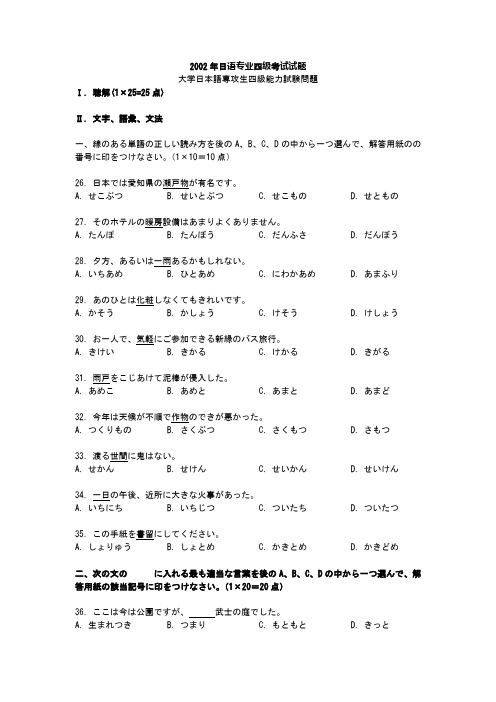
2002年日语专业四级考试试题大学日本語専攻生四級能力試験問題Ⅰ.聴解(1×25=25点)Ⅱ.文字、語彙、文法一、線のある単語の正しい読み方を後のA、B、C、Dの中から一つ選んで、解答用紙のの番号に印をつけなさい。
(1×10=10点)26.日本では愛知県の瀬戸物が有名です。
A.せこぶつB.せいとぶつC.せこものD.せともの27.そのホテルの暖房設備はあまりよくありません。
A.たんぽB.たんぼうC.だんふさD.だんぼう28.夕方、あるいは一雨あるかもしれない。
A.いちあめB.ひとあめC.にわかあめD.あまふり29.あのひとは化粧しなくてもきれいです。
A.かそうB.かしょうC.けそうD.けしょう30.お一人で、気軽にご参加できる新緑のバス旅行。
A.きけいB.きかるC.けかるD.きがる31.雨戸をこじあけて泥棒が侵入した。
A.あめこB.あめとC.あまとD.あまど32.今年は天候が不順で作物のできが悪かった。
A.つくりものB.さくぶつC.さくもつD.さもつ33.渡る世間に鬼はない。
A.せかんB.せけんC.せいかんD.せいけん34.一日の午後、近所に大きな火事があった。
A.いちにちB.いちじつC.ついたちD.ついたつ35.この手紙を書留にしてください。
A.しょりゅうB.しょとめC.かきとめD.かきどめ二、次の文のに入れる最も適当な言葉を後のA、B、C、Dの中から一つ選んで、解答用紙の該当記号に印をつけなさい。
(1×20=20点)36.ここは今は公園ですが、武士の庭でした。
A.生まれつきB.つまりC.もともとD.きっと37.両者の関係は冷えいた。
A.打ってB.立ってC.待ってD.切って38.よく来てくれました。
A.あれあれB.どれC.やっD.どれどれ39.各国の人と交流して、自分を。
A.捨てたいB.磨きたいC.流したいD.洗いたい40.今さら謝りに来てももう遅い。
A.のこのこB.よたよたC.とぼとぼD.しゃあしゃあ41.あの人は口が軽いから、秘密をもらし。
2020年日语专业四级题库【历年真题】-2016~2018年日语专业四级考试真题精选及详解【圣才出品
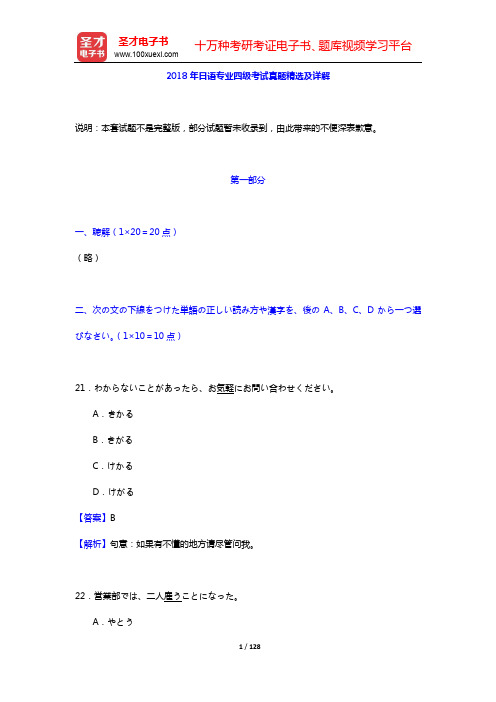
2018年日语专业四级考试真题精选及详解说明:本套试题不是完整版,部分试题暂未收录到,由此带来的不便深表歉意。
第一部分一、聴解(1×20=20点)(略)二、次の文の下線をつけた単語の正しい読み方や漢字を、後のA、B、C、Dから一つ選びなさい。
(1×10=10点)21.わからないことがあったら、お気軽にお問い合わせください。
A.きかるB.きがるC.けかるD.けがる【答案】B【解析】句意:如果有不懂的地方请尽管问我。
22.営業部では、二人雇うことになった。
A.やとうB.やどうC.やしなうD.うしなう【答案】A【解析】句意:营业部雇了两个人。
23.彼は日本の音楽より、韓国の音楽を好んで聞いています。
A.このB.ころC.たのD.よろこ【答案】A【解析】句意:相比于日本音乐,他更喜欢听韩国的音乐。
24.彼女はいつも一人で呟いている。
A.ささやいB.さざやいC.つむやいD.つぶやい【答案】D【解析】句意:她总是一个人喃喃低语。
25.地震の場合は、直ちに机の下に入ってください。
A.たちまちB.そのちC.ただちD.ちょくち【答案】C【解析】句意:发生地震的时候请立刻躲到桌子下面。
26.あの人はいつもおかしなかっこうをしている。
A.格行B.格好C.活行D.活好【答案】B【解析】句意:那人总是一副奇怪的打扮。
27.この薬はお茶と一緒に飲むときかないから、かならずお湯で飲んでください。
A.聞かB.聴かC.効かD.訊か【答案】C【解析】句意:这个药和茶一起喝的话不见效,请一定用热水送服。
28.青信号は「通ってもいい」というあいずです。
A.愛図B.間図C.会図D.合図【答案】D【解析】句意:绿灯表示“可以通行”。
29.学生たちはおしゃべりにむちゅうだ。
A.夢中B.霧中C.務中D.無中【答案】A【解析】句意:学生们聊得热火朝天。
30.長年の努力がみのって、かれは認められるようになった。
A.果B.成C.実D.結【答案】C【解析】句意:多年的努力终于有了回报,他逐渐被人们认可。
- 1、下载文档前请自行甄别文档内容的完整性,平台不提供额外的编辑、内容补充、找答案等附加服务。
- 2、"仅部分预览"的文档,不可在线预览部分如存在完整性等问题,可反馈申请退款(可完整预览的文档不适用该条件!)。
- 3、如文档侵犯您的权益,请联系客服反馈,我们会尽快为您处理(人工客服工作时间:9:00-18:30)。
2000年日语等级考试的4级试题和答案2000年4級日本語能力試験第一部聴解(略)第二部文字語彙もんだいⅠ___のことばはどうよみますか。
1234からいちばんいいものをひとつえらびなさい。
(れい)この学校にがくせいがなんにんいますか。
学校1がくこ2がっこ3がくこう4がっこう正解は4です。
とい1はこの中に三万円のとけいがあります。
①中1うえ2そと3なか4よこ②三万円1さんまんねん2さんまんえん3さんぜんねん4さんぜんえんとい2土よう日の朝、雨がたくさんふりました。
①土よう日1かようび2どようび3すいようび4にちようび②朝1あさ2ばん3ひる4よる③雨1ゆき2くも3かぜ4あめとい3休みの前にテストがあります。
①休み1やすみ2やつみ3おやすみ4おやつみ②前1あと2まえ3とき4さきとい4きょうの午後は、一人でほんを読みます。
①午後1こご2こごう3ごご4ごごう②一人1いちじん2いちにん3ひとり4ふたり③読みます1よみます2やみます3のみます4こみますとい5パーティーがありますから、花を百本かいます。
①花1いす2かさ3はし4はな②百本1ひょっぽん2ひょっぼん3ひゃっぽん4ひゃっぼんとい6北の国のうみの水はあおくてきれいです。
①北1きた2にし3ひがし4みなみ②国1みち2まち3こく4くにくに私の国南の国こく国民中国米国日本国③水1き2みず3すい4もくもんだいⅡ___のことばはどうかきますか。
1234からいちばんいいものをひとつえらびなさい。
(れい)あしたやまへいきます。
やま1川2天3山4田正解は3です。
とい1にほんごのことばをここのつおぼえました。
①にほんご1日本話2日本語3日本詰4日本詔②ここのつ1八つ2四つ3九つ4六つとい2きんようびにあたらしいおんなのせんせいがきました。
①きんようび1全ようび2余よう日3企ようび4金よう日②おんな1安2立3女4文③せんせい1先生2生先3赤生4生赤とい3ひまなじかんにらじおをききます。
①じかん1时間2時間3时闇4時闇②らじお1ラジオ2ラジホ3ヲジオ4ヲジホ③ききます1開きます2関きます3聞きます4闇きますとい4どけいのしたにかれんだーがはってあります。
①した1止2上3木4下②かれんだー1ケレングー2ケレンダー3カレングー4カレンダーもんだいⅢ______のところになにをいれますか。
1234からいちばんいいものをひとつえらびなさい。
(れい)このこうえんは____ひろくありませんね。
1とても2あまり3ちょうど4たくさん正解は2です。
①とりがたくさんそらを____います。
1とんで2はしって3のぼって4さんぽして②このへやはストーブがついていて、____です。
1すずしい2つめたい3あたたかい4あたらしい涼しい冷たい暖かい新しい③はやしさんはからだが_____、よくはたらきます。
1せまくて2よわくて3たいへんで4じょうぶで狭くて弱くて大変で丈夫で④えきではひとがでんしゃにのったり____しています。
1おきたり2おりたり3ついたり4とまったり起きたり降りたり着いたり止まったり止まる姚明氏のビジネス界進出の足取りが止まることはないこのうち9号線南区間は北京西駅に止まる初の地下鉄だ4つ星ホテルに泊まる温家宝総理は11日、泊まるホテルで日本の麻生太郎首相と会見した⑤____でほんをかります。
1ほんや2こんばん3としょかん4えいがかん⑥きょうは____です。
あしたはみっかです。
1ふつか2はつか3よっか4ついたち⑦しけんはおわりました。
きょうしつを____ください。
1すわって2でて3かえって4べんきょうして⑧____なまえをかいてください。
つぎに、しつもんにこたえてください。
1ときどき2もちろん3はじめに4いちばん⑨A「なにか_____はありませんか」B「おちゃでいいですか」A「はい、けっこうです」1くだもの2たべもの3のりもの4のみもの⑩ごはんをたべたあとは「______。
」といいます。
1ごちそうさま2いただきます3しつれいします4おねがいしますもんだいⅣ______のぶんとだいたいおなじいみのぶんはどれですか。
1234からいちばんいいものをひとつえらびなさい。
(れい)このみせではやさいやくだものをうっています。
1ここはやおやです。
2ここはほんやです。
3ここははなやです。
4ここはにくやです。
正解は1です。
①わたしのおばあさんのたんじょうびはじゅうがついつかです。
1わたしのおばあさんはじゅうがついつかにうまれました。
2わたしのおばあさんはじゅうがついつかにしにました。
3わたしのおばあさんはじゅうがついつかにけっこんしました。
4わたしのおばあさんはじゅうがついつかにはじまりました。
②りょうしんはでかけています。
1あねもいもうともいえにいません。
2あにもおとうともいえにいません。
3ちちもははもいえにいません。
4おばもおじもいえにいません。
③きょうはてんきがいいです。
1きょうはくもっています。
2きょうはあめがふっています。
3きょうはゆきがふっています。
4きょうははれています。
④へやがくらいですね。
あかるくしてください。
1でんきをけしてください。
2でんきをつけてください。
3でんきをけさないでください。
4でんきをつけないでください。
⑤たなか:「あのひとはどなたですか。
」1たなかさんはあのひとのいえがわかりません。
2たなかさんはあのひとのなまえがわかりません。
3たなかさんはあのひとのしごとがわかりません。
4たなかさんはあのひとのくにがわかりません。
第三部読解文法もんだいⅠ______のところになにをいれますか。
1234からいちばんいいものをひとつえらびなさい。
(れい)これ____えんぴつです。
1に2を3は4や正解は3です。
①きのうここにだれ____来ましたか。
1は2に3が4を②わたしは山田さん_____ここでまちます。
1が2を3で4に③一日_____2かい、はをみがきます。
1に2で3と4の基準一部屋に3人住みます④テーブルの上にみかん____りんごがあります。
1が2も3を4や⑤母____だいどころにいます。
1に2を3は4で⑥そのことをだれ_____聞きましたか。
1で2を3は4に⑦そうじをしました。
せんたく____おわりました。
1の2に3も4と⑧田中さん____おとといあいました。
1には2では3へは4のは⑨そのかばん____、きのうかいました。
1は2の3に4がはが区別⑩だれ____、山川さんのでんわばんごをおしえてください。
1か2が3は4に(11)ゆうびんきょくは、レストランのみぎです____、ひだりです_____。
1ね;ね2が;が3か;か4よ;よ(12)火よう日_____きょうまでテストがありました。
1だけ2から3は4に(13)わたしのかぞくは、ぜんぶ_____8人です。
1が2の3を4で(14)じてんしゃ____のってかいものにいきました。
1に2で3を4が自転車に乗って世界一周を目指した日本人が中国湖北省武漢で自転車を盗まれた事件が話題となっている(15)雨____かわのみずがきたなくなりました。
1は2で3の4にもんだいⅡ______のところになにをいれますか。
1234からいちばんいいものをひとつえらびなさい。
①このへやは_____ありませんが、きれいです。
1あたらしく2あたらしい3あたらしいでは4あたらしくては②きのうはあまり____です。
1あつかった2あついかった3あつくなかった4あついじゃなかった③まどから_____かぜがはいりますよ。
1すずしい2すずしいの3すずしいな4すずしくて④もうちょっと_____を、見せてください。
1やすいな2やすいも3やすいの4やすくて⑤あねはピアノがじょうず____。
1はなかったです2ではないでした3くなかったです4ではありませんでした⑥このまちは____べんりなところです。
1にぎやか2にぎやかだ3にぎやかで4にぎやかの⑦じしょを____かんじをおぼえます。
1見る2見て3見た4見に⑧あさはいそがしくてしんぶんは_____。
1読みた2読んだ3読みない4読まない⑨パンを半分に____ください。
1きて2きって3きりて4きらって⑩こどもがねているから、大きいこえで_____ね。
1うたいないで2うたうないで3うたわなくて4うたわないで(11)わたしはげんかんのドア_____。
1があいた2があけた3をあいた4をあけた(12)そこのつくえにボールペンが_____。
1おきます2おきてあります3おいています4おいてありますいすが並んでいる―いすが並べてある茶碗が割れている―茶碗が割ってある床が汚れている―床がよごしてあるビールが冷えている―ビールが冷やしてある(13)こどもたちはもうこうえんに____から、うちにはいません。
1行く2行った3行って4行かなかった(14)じゅぎょう中だから、____してください。
1しずかに2しずかで3しずかだ4しずかな(15)わたしはさくぶんを____とき、いつもペンをつかいます。
1書いた2書いて3書く4書きにもんだいⅢ______のところになにをいれますか。
1234からいちばんいいものをひとつえらびなさい。
①おかあさんは_____でんしゃで来ますか。
1どの2どれ3どこ4どちら②ここが、あなた_____のへやです。
1など2ごろ3ほど4がた③けさ、何時____かいしゃにつきましたか。
1まで2でも3ごろ4ぐらい④お国は_____ですか。
1何2どの3どこか4どちら⑤一年に____ぐらいゆきがふりますか。
1どこ2どの3どう4どんな⑥かぜが____からまどをしめました。
1つよくしました2つよくなりました3つよいにしました4つよいになりましたもんだいⅣどのこたえがいちばんいいですか。
1234からいちばんいいものをひとつえらびなさい。
①A「どうぞはいってください。
」。
B「では、_____。
」1しつれいです2しつれいでした3しつれいします4しつれいしました②A「しゅくだいはもう出しましたか。
」。
B「いいえ。
きのうしゅくだいがありましたか。
わたしは_____。
」1おぼえません2しりませんでした3おばえませんでした4しっていませんでした③A「コーヒーは、いかがですか。
」。
B「はい、_____。
」1どういたしまして2いただきます3いらっしゃいませ4こちらこそ④A「あしたいっしょにテニスをしませんか。
」。
B「ええ、_____。
」1しません2そうです3しましょう4そうしませんもんだいⅤつぎの(ァ)から(エ)には何を入れますか。
したの1?2?3?4からいちばんいいものをひとつえらびなさい。
キム「田中さん、おはようございます。
」田中「おはようございます。
」キム「きのうの休みにはどこかへでかけましたか。
」田中「いいえ。
ほんとうは山へ行きたかったですが…」キム「ああ、きのうはあさから(ァ)。
